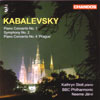Kabalevsky Piano Concertos Nos 1 & 4; Symphony No 2
Echoes of Rachmaninov, sure - but just who is echoing whom?
View record and artist detailsRecord and Artist Details
Composer or Director: Dmitry Borisovich Kabalevsky
Label: Chandos
Magazine Review Date: 1/2007
Media Format: CD or Download
Media Runtime: 68
Mastering:
Stereo
DDD
Catalogue Number: CHAN10384

Tracks:
| Composition | Artist Credit |
|---|---|
| Concerto for Piano and Orchestra No. 1 |
Dmitry Borisovich Kabalevsky, Composer
BBC Philharmonic Orchestra Dmitry Borisovich Kabalevsky, Composer Kathryn Stott, Piano Neeme Järvi, Conductor |
| Concerto for Piano and Orchestra No. 4, 'Prague' |
Dmitry Borisovich Kabalevsky, Composer
BBC Philharmonic Orchestra Dmitry Borisovich Kabalevsky, Composer Kathryn Stott, Piano Neeme Järvi, Conductor |
| Symphony No. 2 |
Dmitry Borisovich Kabalevsky, Composer
BBC Philharmonic Orchestra Dmitry Borisovich Kabalevsky, Composer Neeme Järvi, Conductor |
Author: David Fanning
As the work of a 24-year-old seeking to make his mark, Kabalevsky's First Piano Concerto is unsurprisingly replete with references to the Russian concerto tradition. Yet just as one notes the seemingly blatant echoes of Rachmaninov's Paganini Rhapsody in the slow movement, one realises that the Rhapsody post-dates the Concerto by six years: evidently Rachmaninov was doing the echoing. Moreover, along with the stylistic affinities comes a less predictable tone of wistful introspection and an urge for symphonic consistency, qualities readily attributable to the influence of Kabalevsky's teacher, Myaskovsky. All this is superbly delineated by Kathryn Stott, completing her outstanding survey of the four Kabalevsky piano concertos with these superbly considered accounts.
Kabalevsky's Second Symphony is again clearly indebted to Myaskovsky. Its relatively conventional layout is capped by a Scherzo that mutates rather neatly into a finale and puts the earnestness of the first two movements firmly behind it. Järvi knocks several minutes off the normal timing of the second and third movements by virtue of a robust, no-nonsense approach that brings more benefits than losses relative to his only current rival, the perfectly serviceable account conducted by Loris Tjeknavorian.
Stott and Järvi steer the Fourth Concerto home in just under 12 minutes, mainly by taking a less drawn-out approach to the slow movement than in the composer's own recording (Olympia - nla). In most respects they surpass that unsubtle if disciplined version, which retains archival interest since the pianist is Yuri Popov, the Moscow Conservatoire student who won the 1979 competition for which the Concerto was composed (it is known as the Prague Concerto, thanks to its basis in three folksongs noted down by Kabalevsky on a visit to the city).
Beautifully recorded and executed, the new Chandos disc is self-recommending for collectors of Soviet music and/or 20th-century piano concertos.
Kabalevsky's Second Symphony is again clearly indebted to Myaskovsky. Its relatively conventional layout is capped by a Scherzo that mutates rather neatly into a finale and puts the earnestness of the first two movements firmly behind it. Järvi knocks several minutes off the normal timing of the second and third movements by virtue of a robust, no-nonsense approach that brings more benefits than losses relative to his only current rival, the perfectly serviceable account conducted by Loris Tjeknavorian.
Stott and Järvi steer the Fourth Concerto home in just under 12 minutes, mainly by taking a less drawn-out approach to the slow movement than in the composer's own recording (Olympia - nla). In most respects they surpass that unsubtle if disciplined version, which retains archival interest since the pianist is Yuri Popov, the Moscow Conservatoire student who won the 1979 competition for which the Concerto was composed (it is known as the Prague Concerto, thanks to its basis in three folksongs noted down by Kabalevsky on a visit to the city).
Beautifully recorded and executed, the new Chandos disc is self-recommending for collectors of Soviet music and/or 20th-century piano concertos.
Discover the world's largest classical music catalogue with Presto Music.

Gramophone Digital Club
- Digital Edition
- Digital Archive
- Reviews Database
- Full website access
From £8.75 / month
Subscribe
Gramophone Full Club
- Print Edition
- Digital Edition
- Digital Archive
- Reviews Database
- Full website access
From £11.00 / month
Subscribe
If you are a library, university or other organisation that would be interested in an institutional subscription to Gramophone please click here for further information.




